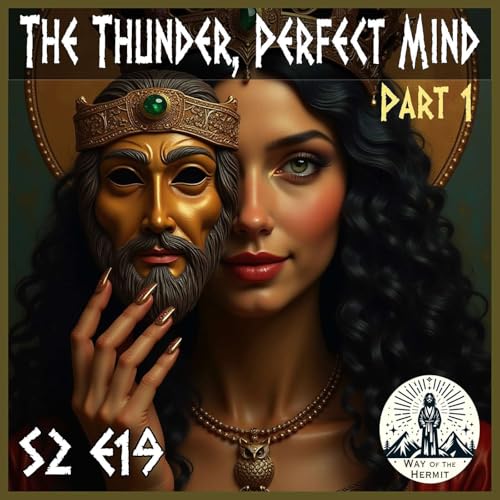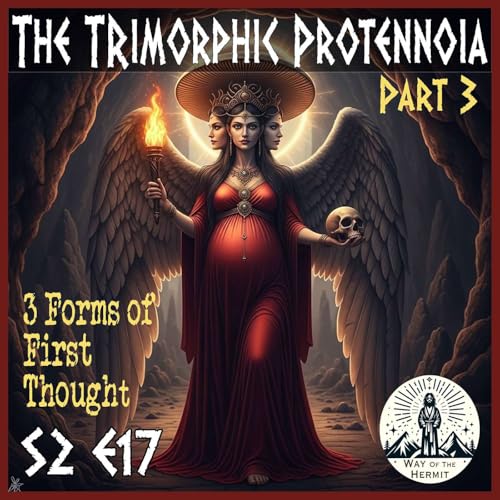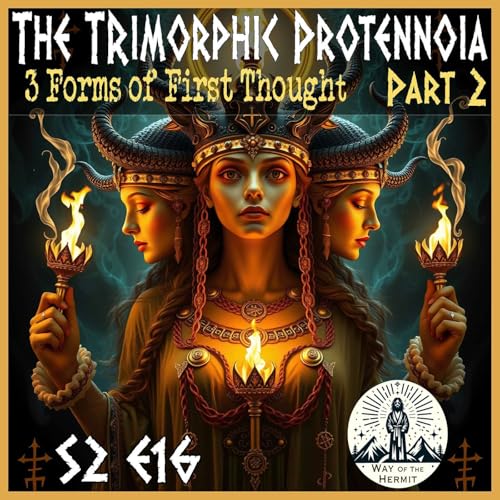In this episode, David and Gene journey into the heart of one of Gnosticism's most profound and transformative myths - the second descent of the Trimorphic Protennoia. This stage represents the "pregnancy" phase in the evolution of consciousness, following the implantation of the seed idea of Unity, during the first descent.
What follows is a psychic apocalypse, an inner "Dark Night of the Soul" where the very foundations of the ego-built world begin to crumble. The established parts of the mind, the Archons, are gripped by a terrifying premonition of their own dissolution. The text vividly portrays this as the birth pangs of a New Aeon, where the death of the old self gives way to the birth of the True Self, an identity conscious of its divine origins.
The Protennoia, having planted the seed as Father, now reveals herself as the Mother - the womb in which this new consciousness gestates. She is the androgynous and self-contained, as symbolized by the Ouroboros. She is the Voice that emerges from the silent Thought. As a prophetess and teacher, she foretells the end of the age of ignorance ruled by the Demiurge.
Hearing her "exalted Speech," the terrified Archons confront their creator, the "false god" who has claimed to be the sole deity. In this dramatic confrontation, the man behind the curtain is exposed, and the entire authority structure of the ego collapses. The Archons, realizing their "tree of life" is actually a "tree of death," are forced to question their very existence and all the choices they have made while under the spell of separation.
From this chaos, a new hope dawns. Acting as a "Mother of Mercy," the Protennoia speaks directly to the "Sons of the Thought" - those parts of the mind ready to receive her hidden mysteries. She invites them into the "Aeon of Barbelo," a new and eternal state of being.
This is a spiritual initiation, a promise of being glorified, enthroned, and baptized in a perfect, exalted Light. The episode unpacks this mystical initiation, explaining that it is not an external ceremony but an internal transformation, an organic process that unfolds from within. This journey leads consciousness back to its source, culminating in the Protennoia taking her seat on a branch of the true Tree of Life, having weathered the apocalypse to establish a new, unshakable center within the self.
Deep Dive:
- The Trimorphic Protennoia - Three Forms of First Thought
Chapters:
- 01:15 Introduction
- 01:56 Review
- 06:25 The Second Descent
- 09:40 Voice From Thought
- 14:00 The Changeless Aeon
- 17:03 Shaking the Foundations of Chaos
- 20:51 False God Revealed
- 23:11 The End is Near
- 26:25 Aeon of Barbelo
- 29:42 Invitation to Initiation
- 33:13 Voice of the Holy Spirit
- 36:05 Conclusions
Resources:
- Trimorphic Protennoia - John D. Turner
- Three Forms of First Thought - Willis Barnstone
- Gnosis.org - The Gnosis Archive6
- The Nag Hammadi Scriptures
- Shekinah (Wikipedia)
- Creative Evolution by Henri Bergson
- The Red Book: A Reader's Edition by Carl Jung
- Jesus and the Lost Goddess by Freke and Gandy
 Oct 31 202546 m
Oct 31 202546 m Sep 30 202541 m
Sep 30 202541 m Aug 31 202539 m
Aug 31 202539 m 41 m
41 m Jun 28 202535 m
Jun 28 202535 m May 31 202546 m
May 31 202546 m May 1 202537 m
May 1 202537 m Mar 29 202539 m
Mar 29 202539 m
